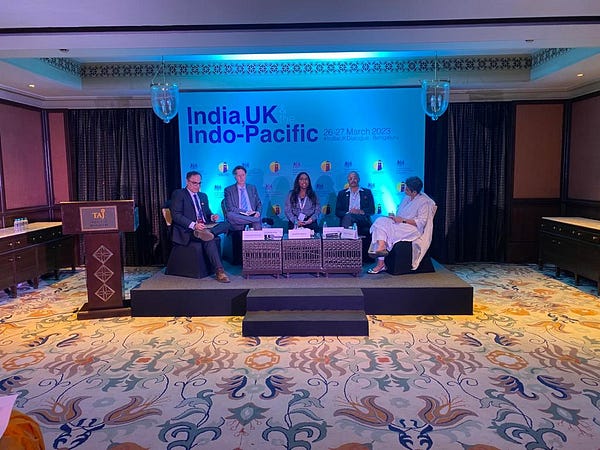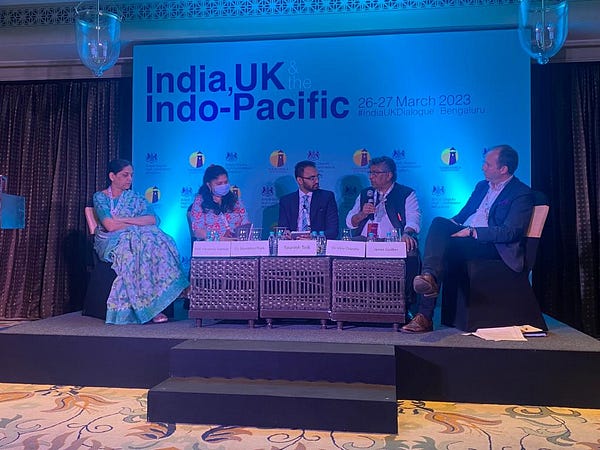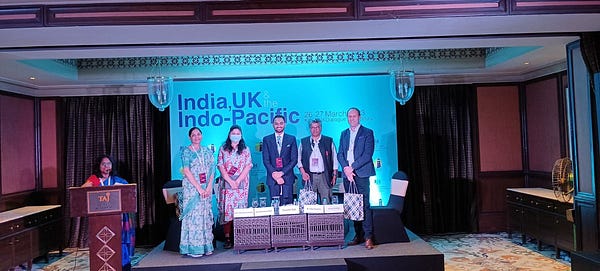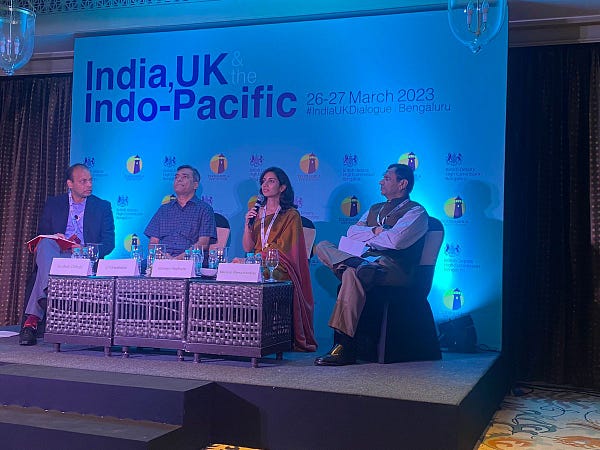India, UK and the Indo-Pacific
Dear Reader,
Hope you are doing well. In this edition, we cover our work on India’s AI ambitions, the missing picture of AI hardware, issues with RBI’s mandate on recurring payments, China’s legislative sessions, and the banking crisis following the fall of SVB and Credit Suisse and updates from Takshashila alumni meet-ups across the globe.
India, UK and the Indo-Pacific
The Takshashila Institution, in collaboration with the British Deputy High Commission, Bengaluru, co-organised a two-day event on India, UK and the Indo-Pacific on March 26-27, 2023.
The Indo-Pacific is at the heart of the churn in the world order. The region accounts for 65% of the world's population and nearly 50% of the global GDP. It is home to key trade routes, with nearly $3.5 trillion of global trade each year.
The event witnessed panel discussions on the themes of Geopolitics of the Indo-Pacific, Biotechnology & Biosecurity Cooperation in the Indo-Pacific and Technology Governance & Digital Public Infrastructure.
Experts from among diplomats, industry, academia and think tanks participated in the panels. Students and alumni from Takshashila also participated in the event.









AI Race Must Not Overlook AI Hardware
While much of the popular AI discourse has focused on software applications of AI such as chatbots, it is equally important to not lose sight of the other side of AI technology: AI hardware — the computing infrastructure powering AI and its functions. In Takshashila’s latest Issue Brief, we look at our past research on enabling India to become a leader in AI hardware manufacturing.
We argue that India must look to have an AI hardware policy in place, which can give the necessary impetus to manufacture AI inference chips and invest in AI hardware design.
India’s AI Ambitions
In an opinion for the Hindustan Times, Shailesh Chitnis based on his recent research argues that India’s AI ambitions deserve a reality check. Still, the right policies can help correct course in the long run:
What about India? A country’s proficiency in AI rests on five factors: Research, money, regulation, data, and talent. India comes up short on most. Tortoise Global’s 2022 AI Index, which ranks countries by AI preparedness, places India outside the top 10 on all measures, except talent. The AI Index Report from Stanford University reaches a similar conclusion — India is great at producing the brains for AI, but average at everything else.
This may appear harsh. Yet our analysis bears this out.
Uniform Military Code
In the context of the recently introduced Inter-Services Organisations (Command, Control and Discipline) Bill 2023, Lt. Gen. Prakash Menon argues in his column for ThePrint that India’s proposed theatre command system must be accompanied by a Uniform Military Code:
The differences among the individual services exist mostly as a legacy of the British Acts from which the existing laws were derived besides having been shaped by peculiarities of the service conditions across individual Services. The need to harmonise these differences was recognised by the Ministry of Defence (MoD) as early as 1965 when it set up a committee that was mandated to evolve a Common Uniform Code for the three Services. It consisted of officials from ministries of Defence, Law, as also representatives of the three Services, including their Judge Advocates. They were also tasked to make special provisions for each Service, taking into consideration the peculiar requirements of the Service.
RBI & the Recurring Payments Nightmare
In an article for Money Control, Anupam Manur and Bharath Reddy write on RBI’s restrictive rules surrounding recurring payments and the archetype of well-intentioned policies often producing the opposite results:
Though the failure rate for domestic transactions has reduced recently, international transactions continue to be a recurring nightmare a year and a half since this was introduced. There are significant hurdles for Indians who subscribe to global content and services. Most international merchants do not comply with RBI’s regulations.
In response to queries about declined payments from Indian subscribers, The New York Times recommended using a valid US credit card for payments! Global businesses would have set up systems that adhere to a common global standard for payments. Deviating from it, like introducing an SMS-based OTP authentication, requires fresh investments and commitment to set it up.
China’s Legislative Sessions
Manoj Kewalramani, the chairperson of the Indo-Pacific Studies programme at Takshashila, appeared in an online discussion organised by the Center for Strategic & International Studies to speak on the recently concluded session of China’s National People’s Congress:
Also, in an interview with Nitin A Gokhale of Bharat Shakti, Amit Kumar, Research Analyst at Takshashila spoke on the legislative sessions in China, U.S.-China ties and implications for India. Watch here:
Banking Trouble: The SVB & Credit Suisse Saga
Does the collapse of Silicon Valley Bank and Credit Suisse herald wider troubles for banks?
In last Thursday’s All Things Policy, Anupam Manur talks to Shrikrishna Upadhyaya and Aditya Ramanathan about how a combination of macroeconomic factors, monetary tightening, and bad management have conspired to create a major crisis:
Takshashila Alumni Meet-ups
Over the last couple of weeks, Nitin Pai, Pranay Kotasthane and Manoj Kewalramani were part of Takshashila alumni meet-ups at Washington DC, Chennai, Delhi & Hyderabad. The next one is happening is Australia!
We plan to do more alumni meet-ups in the coming weeks, so if you are an alum, please stay tuned at Kalpa.
Applications for GCPP May Cohort are Open
The GCPP is offered over 12 weeks and is the ideal introductory course to public policy and governance for working professionals. It will help you master the fundamentals of economics, policy evaluation, ethical reasoning, effective communication and public persuasion. All classes are online and held on weekends.
The GCPP is available in three streams: Defence and Foreign Affairs, Technology & Policy & Advanced Public Policy.
Applications for the May 2023 Graduate Certificate in Public Policy (GCPP) cohort are open till April 23, 2023.
The next cohort of GCPP begins on May 6, 2023.
That’s all from us this week. Take care!







